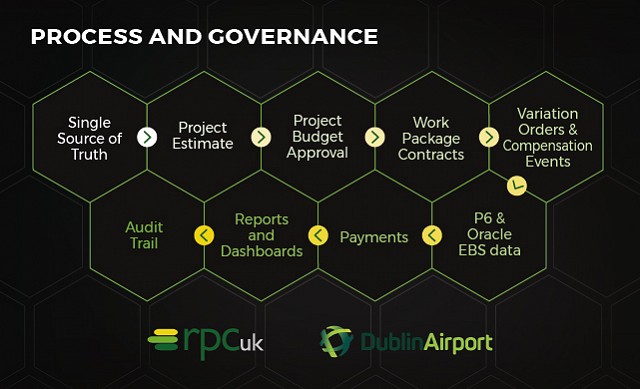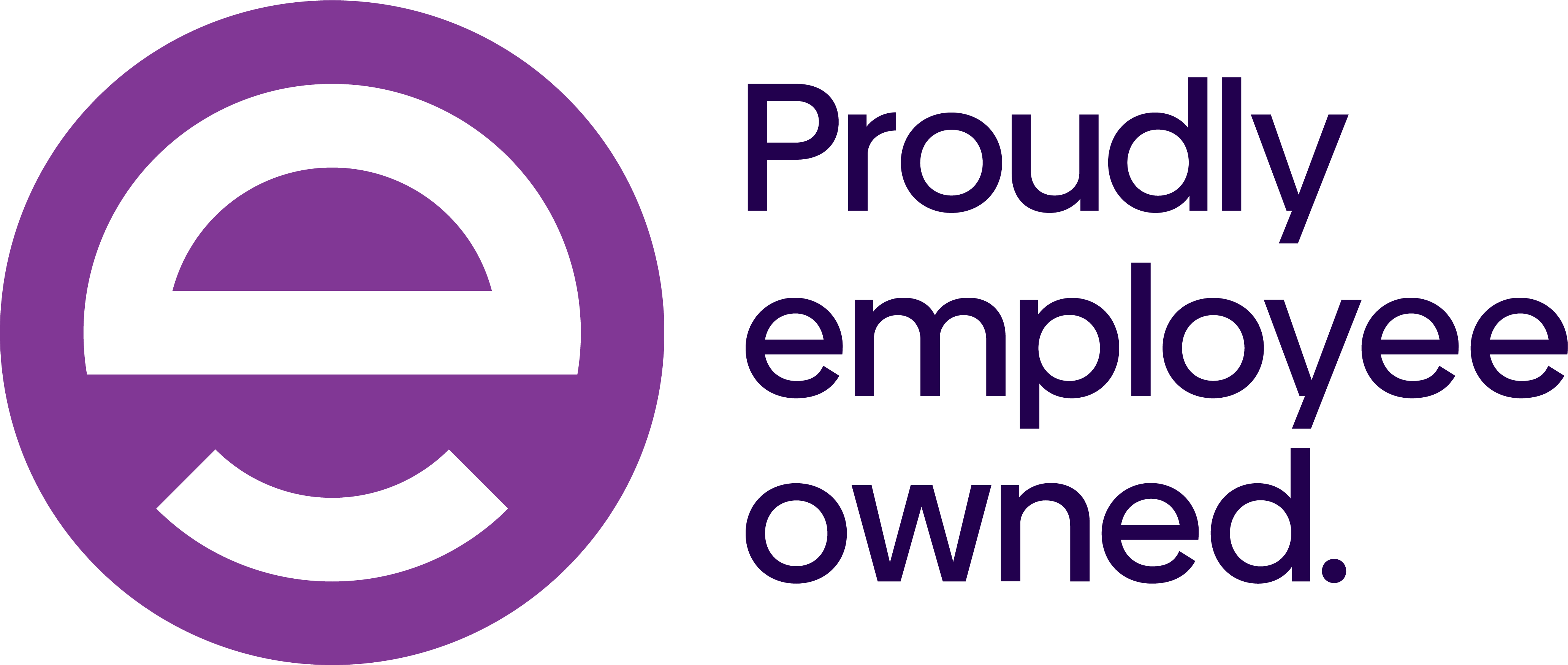Oracle Primavera Unifier: Solutions to Complex Cost Management for Dublin Airport Authority

RPCuk Technical Director, Dave Hurren, took to the stage in the Case Study Zone at this year’s Project Controls Expo together with Alan Duffy, Head of Asset Management at Dublin Airport Authority (daa). They were there to share with an interested audience the experiences, challenges and solutions of implementing Oracle Primavera Unifier in the cost management of Dublin’s ongoing major airport expansion project. Two years ago at PCE, Alan was in the crowd listening to Dave speaking and realised that Oracle Primavera Unifier might be the solution to how he was going to manage the costs for the next phase of the daa expansion project. A meeting followed and here we are now, 11 months into a 16-month implementation.
As the Unifier project prepares to go live in its first phase later this month, it is a good time for reflection on the processes of scoping requirements, shaping solutions and planning outcomes for what is a huge business shift for the team at daa. If you weren’t able to hear them talk in person, this summary of the presentation should give you an idea of the enormity of the challenge and the power of Unifier to transform cost management functionality on a major scale.
daa, is more than just the Airport that serves Dublin. It is a holding company consisting of Dublin Airport, Cork Airport, ARI – the authority’s retail arm – and daa International. As a whole, it’s a busy operation with a high turnover and multiple assets in addition to the main Dublin Airport:
- Cork Airport has a single terminal, serving 48 destinations and handling approximately 2.4 million passengers a year
- ARI offers airport shopping operations in Ireland, mainland Europe, the Middle East, Central Asia and North America with a combined annual turnover in excess of $1billion
- daa International offers terminal operations solutions, specialist consultancy services and tailored training aimed at international airport owners and operators. Their services range from project management of lounge fit-outs in London Heathrow to the management of the new T5 at King Khalid International Airport in Riyadh, Saudi Arabia
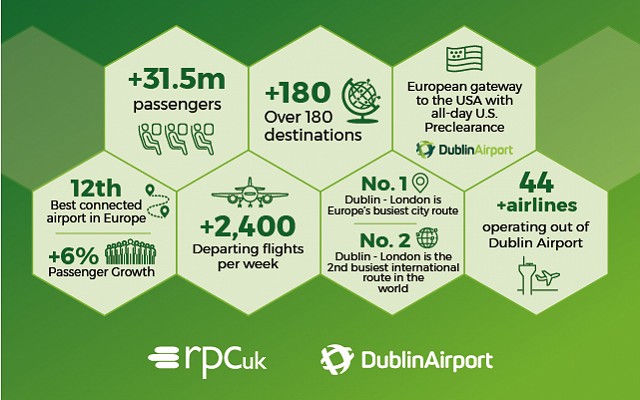
The airport in Dublin opened in January 1940, when it catered for 100,000 passengers a year. By 2024, passenger numbers are forecast to reach 38.1 million per year, but passenger traffic is only part of the story: the airport managed 151 thousand tonnes of cargo in 2018 and hosted 2.1 million flight connections – a 23 per cent rise on the previous year.
Expansion is essential to cope with this growing demand by increasing capacity and the airport expansion project is Ireland’s largest capital investment programme, with a total budget of 1.7 billion Euros. The project will include work on a north and south hub, piers and terminals, enlargement and refurbishment of the apron and extensive works on the airfield, surrounding roads and car parks, underpass and associated civils infrastructure. The current expansion phase is a four-year plan due for completion this year. The next stage of the development is for construction planned in process for 2020–24, and it is this stage that the Unifier solution is first being implemented in. But a further phase of construction is planned to follow post 2025, with a major expansion planned on land to the west of the existing runway.
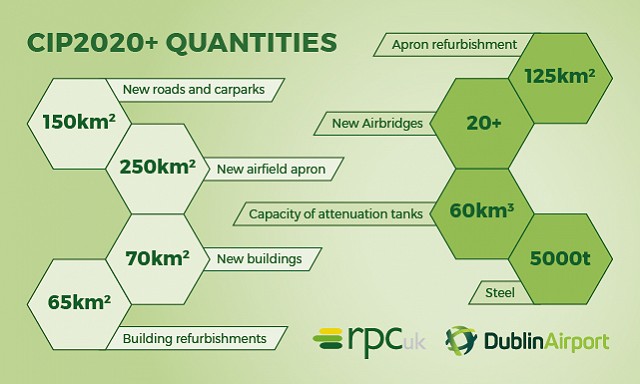
But the physical size of the airport is not the only challenge faced by daa in achieving their desired increase in traffic. Manual processes and inefficient systems hinder or even restrict growth, so daa took the decision to engage external consultants to overhaul their manual operations and streamline work practices whilst compiling contemporaneous and auditable records.
The expansion plan is for construction to begin in 2020, with more than 140 construction projects across the site due for completion by 2024, all delivered with the help of 17 Project Controls members of staff and 156 in Asset Management and Development. This is clearly a huge project, in a location with a limited pool of contractors and a difficult ‘air tight’ environment air-side of the airport. In a situation where business challenges are significant, strict cost controls and auditability are key, as is the importance of confidence in the data you are working with.
Oracle Primavera Unifier was selected as the best solution for helping daa to manage this broad portfolio of works: it is totally configurable, adaptable to change and versatile enough to be adopted by other departments within the business and tailored to their specific needs. Oracle products were already in use in other areas of the business and although this was not the most compelling driver in the decision-making process, it was a positive factor. Once fully implemented, Unifier will remove up to 90 per cent of the asset management and development manual processing by automating processes such as producing project cost reports, monthly Capex spend reports, change logs, risk reports and more.
How can Unifier help with Cost Management Process and Governance?
Unifier supports a rigorous process and governance methodology, fundamentally by presenting a single source of truth to all areas of the business, and controlling information from business processes by ensuring that nothing can be entered or amended without several approvals. The daa cost controls process starts with detailed estimate and budget approval within Unifier, breaking down project costs using the CBS structure based on the BCIS Standard elements. Once the project budget has been approved, Work Package Contracts are loaded into Unifier and costs assigned to CBS nodes as required; any CBS node may hold data from multiple projects. Unifier also manages Variation Orders, Early Warnings and Compensation Events – daa requires that any changes are preceded by an Early Warning Notice, but by operating with separate processes, these will have no impact on any data held within the project unless they are accepted and processed as a change. An integration exercise means that data from within Oracle Primavera P6 and Oracle E-Business Suite will be incorporated automatically, creating direct links between costs in Unifier and monies paid using the Oracle E-BS. Special enhancements even make it possible to handle transactions in foreign currencies without any additional demand on Unifier or Oracle administrators.
Payments can be authorised and made according to detailed cost breakdowns submitted directly from contractors and evaluated within the system, and records of payments made are filed automatically in Unifier. Up-to-date, accurate, tailored cost reporting straight out of Unifier makes light work of managing costs, yet can be amended in line with evolving requirements as necessary. As well as reports, dashboards offer strong visuals, snap-shot management reports, user task reminders, project health checks and more – and are configurable to use any combination of the information available in Unifier. And behind all the day-to-day functionality sits a clear audit trail.
In a hugely complex organisation and major, wide-ranging construction programme, full integration is a stretch, but even a partial streamlining and integration project offers significant improvements over the existing daa ways of working. The use of multiple spreadsheets has led to an untrustworthy data set, which has been poorly archived after project completion, making it impossible to accurately review projects or forecast using historical data. Unifier can make a dramatic difference to this, offering major benefits for the business going forward.
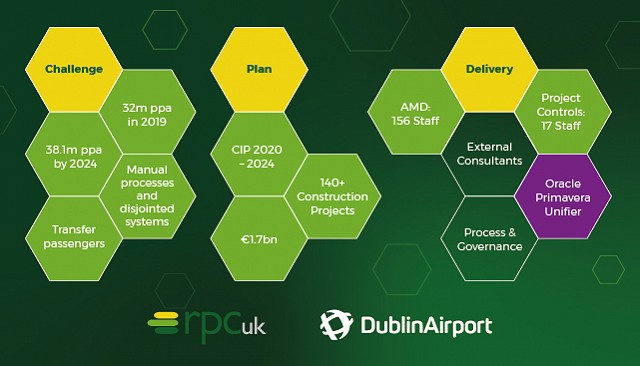
How RPCuk are helping to make it a reality
As with all projects, whatever the size, RPCuk’s involvement starts with some initial investigations, followed by a scoping study to iron out detailed requirements together with the client. The scoping document created from this phase aims to set out all the requirements, together with the proposed solutions and products, and recommendations regarding implementation and capabilities. In the case of daa, the scoping study results set out 7 phases of work, or ‘delivery packages’ – the first four designed around removing the spreadsheets currently in use and the integration of new and existing applications, and the final three expanding on this with a fully integrated Enterprise platform and incorporating close-out and archiving of data on project completion and handover to asset management. The plan focused on the necessary core capabilities, with incremental enhancements at each stage to take daa from their starting position to a complete enterprise PMO system in easy stages.
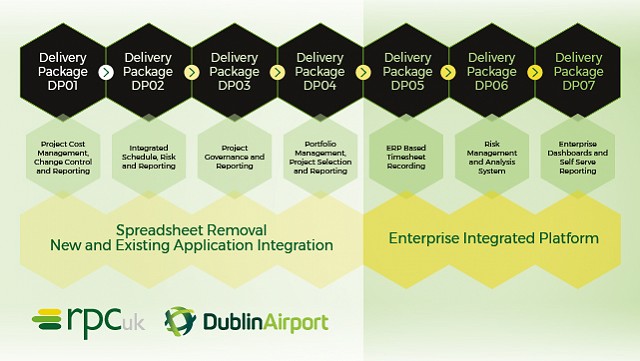
Key to getting buy-in at all levels of the business is to present a clear business case, with a full business analysis and justification, and a clear and achievable business plan. With daa, RPC decided to break down the deployment into sprints, each one consisting of key deliverables which would build into a full deployment throughout the project lifecycle. Crucially, this would enable the daa business to see a quicker return on investment by allowing the project to go live in stages, rather than in one – much later – launch.
The objective for the project implementation is to transform working practices from multiple spreadsheets and bespoke, developed applications to an integrated Oracle solution, using Unifier, P6, PRA and EBS, enabling a staged plan of deployment, migration and adoption. This staged approach simplifies the migration from old methods and ways of working to a new, integrated, connected set of methodologies, enabling increased transparency across the project delivery lifecycle.
The new system, once enabled, will transform the analysis and reporting processes as it will be the first time that all data has been consolidated, the first time that cost data has been drillable at the project structure, not vendor structure, the first time that contracts and changes can be analysed by cost structure and the first time that AFC and VOW can be analysed in detail across the projects and portfolios. It’s a major business change for daa, but offers clear and compelling benefits for cost management through a powerful portfolio of Oracle Primavera solutions, implemented by RPCuk, who are very proud to be part of this major project to take Dublin Airport into the future.
